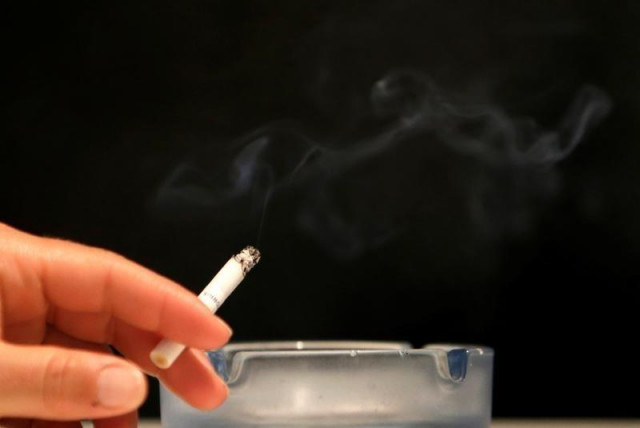PTI govt likely to increase tax on cigarettes in budget
With such revenues, it will fund health insurance, disease control programmes

An individual smokes a cigarette in this representational image. PHOTO: REUTERS
In February this year, the National Health Services and Coordination Division presented a draft of the Health Levy Bill 2019, proposing imposition of a health levy on cigarettes and sugary beverages. However, the Federal Board of Revenue (FBR) opposed the levy on the cigarette manufacturing industry. The Finance Division, on the other hand, agreed to impose the tax on cigarette.
The FBR has already introduced a third tier of federal excise duty for the cigarette industry during tenure of the previous Pakistan Muslim League-Nawaz (PML-N) government, which caused a loss of billions of rupees to the national exchequer. The FBR opposed the health levy as it had been in favour of lower taxes on the cigarette industry. The Senate referred the matter to a special committee, constituted to probe the decline in tax revenue flow from the cigarette industry.
The committee has sent its report to the Senate. Its chairman pointed out that tax collection from cigarette manufacturers had dropped to Rs74 billion following introduction of the third duty tier and urged the government to implement the committee’s recommendations in order to enhance revenue receipts to Rs120 billion by the end of current fiscal year on June 30, 2019.
The Public Accounts Committee had on May 23, 2018 recommended a special audit by the Auditor General of Pakistan (AGP) to find reasons for the significant drop in tax collection from the cigarette industry.
An AGP report and recommendations of the special parliamentary panel clearly pointed to lobbying by big companies and introduction of the third duty slab as reasons for the decline in revenues.
The AGP report revealed that cigarette production by multinational companies had increased and their profits also went up. However, government revenues fell. On the basis of this report, the National Accountability Bureau (NAB) has initiated an investigation.
Now, the government wants to impose more taxes on the cigarette industry in an attempt to generate additional revenues. Documents show that the cabinet, chaired by Prime Minister Imran Khan, has directed the National Health Services and Coordination Division to provide a feasible and effective tax proposal in order to achieve objectives of the draft of health levy bill.
The Prime Minister’s Office had taken keen interest in imposing the health levy on the cigarette industry and sugary beverages and had directed the health services division to prepare a summary for consideration of the Economic Coordination Committee (ECC) of the cabinet.
Complying with the directive, the division proposed the levy of a sin tax of Rs10 per pack of 20 cigarettes and one rupee per bottle of 250ml of sugary drinks for financing the health insurance scheme and the fatal disease control programme.
Documents reveal that the Cabinet Division was of the view that the imposition of any tax fell within the meaning of money bill as provided in Article 73(2)(a) of the constitution. A money bill is moved in the National Assembly after seeking approval of the cabinet in accordance with Rule 16(1)(a) and (d) of Rules of Business 1973.
Moreover, it was suggested to obtain views of the FBR and Ministry of Law and Justice. The Finance Division agreed in principle to the proposal. However, the FBR did not give its backing by quoting different articles of the constitution and illicit trade issues.
Published in The Express Tribune, April 4th, 2019.
Like Business on Facebook, follow @TribuneBiz on Twitter to stay informed and join in the conversation.



















COMMENTS
Comments are moderated and generally will be posted if they are on-topic and not abusive.
For more information, please see our Comments FAQ